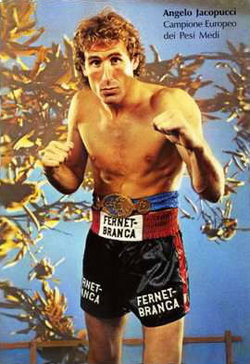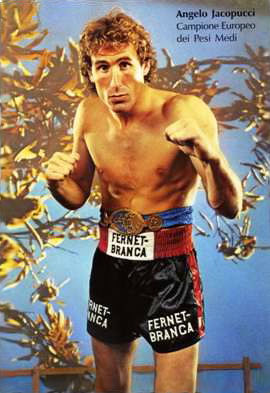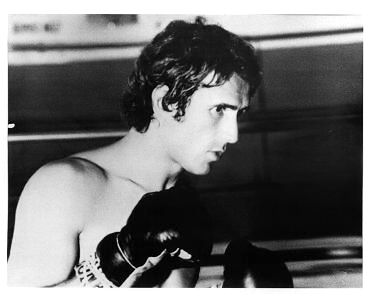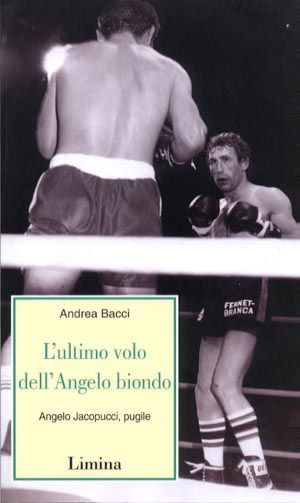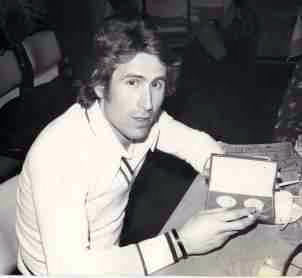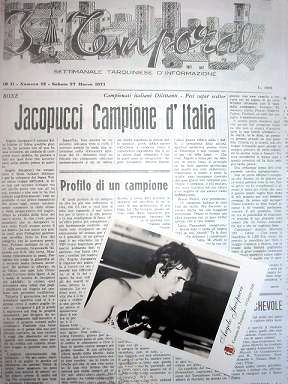Tratto e modificato da Wikipedia.
Angelo Jacopucci è stato un pugile italiano. Chiamato affettuosamente il brigetto dai suoi concittadini, è un nome storico per la boxe Italiana ed Europea, avendo vinto il titolo continentale nei pesi medi. Eppure, nonostante sia riuscito a far suonare l'inno italiano per un campionato europeo di boxe, finirà per essere uno dei tanti martiri dello sport finiti sfortunatamente nel dimenticatoio.
CARRIERA - I SUCCESSI
Esordì tra i professionisti l'8 luglio 1973 sul ring di Tuscania, dove sconfisse alla 6ª ripresa il britannico Lawrence Ekpeli. Da quel momento Jacopucci inanellò 40 incontri professionistici, vincendo un titolo europeo dei Pesi Medi.
LA TRAGICA MORTE
Il 19 luglio 1978, sul ring di Bellaria, affrontò l'inglese Alan Minter. Alla 12ª ripresa abbassò improvvisamente la guardia, consentendo a Minter di colpirlo ripetutamente e duramente al volto. Jacopucci era alla mercé dell'avversario, la testa, rimbalzando all'indietro, era sottoposta a traumi evidenti, i muscoli del collo erano rilassati e non offrivano più la seppur minima resistenza. A quel punto ci sarebbero stati tutti i presupposti per una immediata interruzione del match. Ma né l'arbitro, né i secondi, né il medico a bordo ring, lo fecero e questa incapacità di prevenire il peggio gli fu fatale. Durante la cena, poche ore dopo l'incontro, davanti allo stesso Minter, avvertì dei forti attacchi di vomito. Una volta tornato in albergo cadde improvvisamente in coma. Trasportato immediatamente all'ospedale "Bellaria" di Bologna (curiosamente recante lo stesso nome della cittadina romagnola in cui aveva da poco combattuto), il pugile laziale morì per emorragia cerebrale nella mattina del 22 luglio 1978.
LE CONSEGUENZE DELLA MORTE DI JACOPUCCI NEL MONDO DELLA BOXE
La morte del pugile tarquiniese rappresentò, in un certo senso, la fine di un'epoca per il pugilato, in quanto da allora, furono apportate modifiche sostanziali nel regolamento atte a tutelare la salute degli atleti: le riprese di un titolo europeo furono ridotte a 12, dalle 15 originarie. Fu richiesta obbligatoriamente la TAC cranica di ciascun pugile, nell'ambito delle visite mediche rituali. Non furono più ammessi incontri in zone distanti più di un'ora da un centro neurologico.
IN RICORDO
A Tarquinia, sua città natale, gli sono stati dedicati il palazzetto dello sport e una corsa ciclistica. Nel 1990, a 12 anni dalla morte, un gruppo punk rock polacco, Kult, dedicò una canzone a questo pugile. La canzone intitolata, appunto, "Angelo Jacopucci", ha un testo e una musica molto crudi, come cruda è stata la sua fine. L'unica imprecisione è che nel testo hanno sbagliato la data dell'incontro. Nel 2006 Andrea Bacci pubblica un libro dal titolo "L'ultimo volo dell'Angelo Biondo" che riporta, in base ad alcune testimonianze, la vita e, in particolare, gli ultimi giorni del nostro pugile. Si parla già da qualche anno, della possibilità di realizzare un film sulla sua vita. L'opera più grande l'hanno comunque fatta, nel corso degli anni, i ricordi di chi lo conosceva e lo stimava, che hanno contribuito a rinverdire, anche se non completamente, il ricordo di un uomo che, almeno per la boxe europea, è sicuramente stato un personaggio importante, e senza i quali il brigetto sarebbe rimasto totalmente sconosciuto alle nuove generazioni.
ENGLISH
Taken and modified from Wikipedia.
Angelo Jacopucci was an Italian boxer. Affectionately called The Brigetto by his fellow citizens, is a historical name for the Italian and European boxing, having won the continental title in the middleweight. And yet, despite being able to sound the Italian anthem for a European championship boxing, will end up being one of the many martyrs of the sport unfortunately gone into oblivion.
CAREER - SUCCESSES He started his career on July 8, 1973 in the professionals ring on Tuscania, where he defeated the British Ekpeli Lawrence at the 6th shooting. From that moment collected 40 professional matches, winning a European title of Middleweight.
THE TRAGIC DEATH
On July 19, 1978, on the ring of Bellaria, confronted the British Alan Minter. At the 12th shooting suddenly lowered his guard, allowing Minter and hard to hit him repeatedly in the face. Jacopucci was at the mercy of the opponent, the head, bouncing back, was subjected to obvious trauma, the neck muscles were relaxed and no longer offered the slightest resistance. At that point there would be every reason for immediate termination of the match. But neither the referee nor the second nor the doctor at ringside, they did and this inability to prevent the worst was fatal. During dinner, a few hours after the match, faced with the same Minter, warned of severe attacks of vomiting. After returning to the hotel suddenly fell into a coma. Immediately transported to the "Bellaria" hospital in Bologna (curiously bearing the same name as the town of Romagna where he had just fought), the boxer from Lazio died of cerebral hemorrhage on the morning of July 22, 1978.
THE CONSEQUENCES OF THE DEATH OF JACOPUCCI IN THE WORLD OF BOXING
The death of Tarquinian boxer represented, in a certain sense, the end of an era for boxing, because since then, substantial changes were made in the regulation aimed at protecting the health of athletes: the shooting of a European title was reduced to 12, 15 from the original. Cranial CT scan was required to request of each boxer, as part of medical rituals. They were never allowed meetings in areas far more than an hour from a neurological center.
IN MEMORY
At Tarquinia, his hometown, he has been dedicated to the Sport Palace and a bicycle race. In 1990, 12 years after his death, a Polish punk rock band, Kult, dedicated a song to this boxer. The song entitled, precisely, Angelo Jacopucci, has a very raw text and music, raw as it was his end. The only inaccuracy is that the text had the wrong date of the meeting. Andrea Bacci in 2006 published a book titled "The last flight of the Blonde Angel" that shows, according to some testimonies, life and, in particular, the last days of our boxer. There is talk for a few years, of the possibility of making a film about his life. The greatest work, however, have made, over the years, the memories of those who knew him and admired him, who have helped to revive, although not completely, the memory of a man who, at least for boxing European has certainly been an important person, and without which The Brigetto would have remained totally unknown to the new generations.
Tratto e modificato da Wikipedia.
Angelo Jacopucci è stato un pugile italiano. Chiamato affettuosamente il brigetto dai suoi concittadini, è un nome storico per la boxe Italiana ed Europea, avendo vinto il titolo continentale nei pesi medi. Eppure, nonostante sia riuscito a far suonare l'inno italiano per un campionato europeo di boxe, finirà per essere uno dei tanti martiri dello sport finiti sfortunatamente nel dimenticatoio.
CARRIERA - I SUCCESSI
Esordì tra i professionisti l'8 luglio 1973 sul ring di Tuscania, dove sconfisse alla 6ª ripresa il britannico Lawrence Ekpeli. Da quel momento Jacopucci inanellò 40 incontri professionistici, vincendo un titolo europeo dei Pesi Medi.
LA TRAGICA MORTE
Il 19 luglio 1978, sul ring di Bellaria, affrontò l'inglese Alan Minter. Alla 12ª ripresa abbassò improvvisamente la guardia, consentendo a Minter di colpirlo ripetutamente e duramente al volto. Jacopucci era alla mercé dell'avversario, la testa, rimbalzando all'indietro, era sottoposta a traumi evidenti, i muscoli del collo erano rilassati e non offrivano più la seppur minima resistenza. A quel punto ci sarebbero stati tutti i presupposti per una immediata interruzione del match. Ma né l'arbitro, né i secondi, né il medico a bordo ring, lo fecero e questa incapacità di prevenire il peggio gli fu fatale. Durante la cena, poche ore dopo l'incontro, davanti allo stesso Minter, avvertì dei forti attacchi di vomito. Una volta tornato in albergo cadde improvvisamente in coma. Trasportato immediatamente all'ospedale "Bellaria" di Bologna (curiosamente recante lo stesso nome della cittadina romagnola in cui aveva da poco combattuto), il pugile laziale morì per emorragia cerebrale nella mattina del 22 luglio 1978.
LE CONSEGUENZE DELLA MORTE DI JACOPUCCI NEL MONDO DELLA BOXE
La morte del pugile tarquiniese rappresentò, in un certo senso, la fine di un'epoca per il pugilato, in quanto da allora, furono apportate modifiche sostanziali nel regolamento atte a tutelare la salute degli atleti: le riprese di un titolo europeo furono ridotte a 12, dalle 15 originarie. Fu richiesta obbligatoriamente la TAC cranica di ciascun pugile, nell'ambito delle visite mediche rituali. Non furono più ammessi incontri in zone distanti più di un'ora da un centro neurologico.
IN RICORDO
A Tarquinia, sua città natale, gli sono stati dedicati il palazzetto dello sport e una corsa ciclistica. Nel 1990, a 12 anni dalla morte, un gruppo punk rock polacco, Kult, dedicò una canzone a questo pugile. La canzone intitolata, appunto, "Angelo Jacopucci", ha un testo e una musica molto crudi, come cruda è stata la sua fine. L'unica imprecisione è che nel testo hanno sbagliato la data dell'incontro. Nel 2006 Andrea Bacci pubblica un libro dal titolo "L'ultimo volo dell'Angelo Biondo" che riporta, in base ad alcune testimonianze, la vita e, in particolare, gli ultimi giorni del nostro pugile. Si parla già da qualche anno, della possibilità di realizzare un film sulla sua vita. L'opera più grande l'hanno comunque fatta, nel corso degli anni, i ricordi di chi lo conosceva e lo stimava, che hanno contribuito a rinverdire, anche se non completamente, il ricordo di un uomo che, almeno per la boxe europea, è sicuramente stato un personaggio importante, e senza i quali il brigetto sarebbe rimasto totalmente sconosciuto alle nuove generazioni.
ENGLISH
Taken and modified from Wikipedia.
Angelo Jacopucci was an Italian boxer. Affectionately called The Brigetto by his fellow citizens, is a historical name for the Italian and European boxing, having won the continental title in the middleweight. And yet, despite being able to sound the Italian anthem for a European championship boxing, will end up being one of the many martyrs of the sport unfortunately gone into oblivion.
CAREER - SUCCESSES He started his career on July 8, 1973 in the professionals ring on Tuscania, where he defeated the British Ekpeli Lawrence at the 6th shooting. From that moment collected 40 professional matches, winning a European title of Middleweight.
THE TRAGIC DEATH
On July 19, 1978, on the ring of Bellaria, confronted the British Alan Minter. At the 12th shooting suddenly lowered his guard, allowing Minter and hard to hit him repeatedly in the face. Jacopucci was at the mercy of the opponent, the head, bouncing back, was subjected to obvious trauma, the neck muscles were relaxed and no longer offered the slightest resistance. At that point there would be every reason for immediate termination of the match. But neither the referee nor the second nor the doctor at ringside, they did and this inability to prevent the worst was fatal. During dinner, a few hours after the match, faced with the same Minter, warned of severe attacks of vomiting. After returning to the hotel suddenly fell into a coma. Immediately transported to the "Bellaria" hospital in Bologna (curiously bearing the same name as the town of Romagna where he had just fought), the boxer from Lazio died of cerebral hemorrhage on the morning of July 22, 1978.
THE CONSEQUENCES OF THE DEATH OF JACOPUCCI IN THE WORLD OF BOXING
The death of Tarquinian boxer represented, in a certain sense, the end of an era for boxing, because since then, substantial changes were made in the regulation aimed at protecting the health of athletes: the shooting of a European title was reduced to 12, 15 from the original. Cranial CT scan was required to request of each boxer, as part of medical rituals. They were never allowed meetings in areas far more than an hour from a neurological center.
IN MEMORY
At Tarquinia, his hometown, he has been dedicated to the Sport Palace and a bicycle race. In 1990, 12 years after his death, a Polish punk rock band, Kult, dedicated a song to this boxer. The song entitled, precisely, Angelo Jacopucci, has a very raw text and music, raw as it was his end. The only inaccuracy is that the text had the wrong date of the meeting. Andrea Bacci in 2006 published a book titled "The last flight of the Blonde Angel" that shows, according to some testimonies, life and, in particular, the last days of our boxer. There is talk for a few years, of the possibility of making a film about his life. The greatest work, however, have made, over the years, the memories of those who knew him and admired him, who have helped to revive, although not completely, the memory of a man who, at least for boxing European has certainly been an important person, and without which The Brigetto would have remained totally unknown to the new generations.
